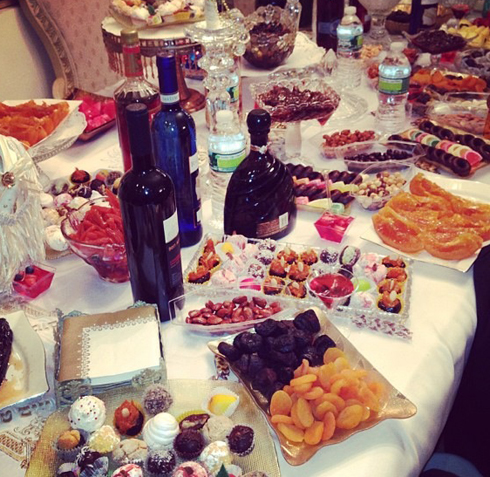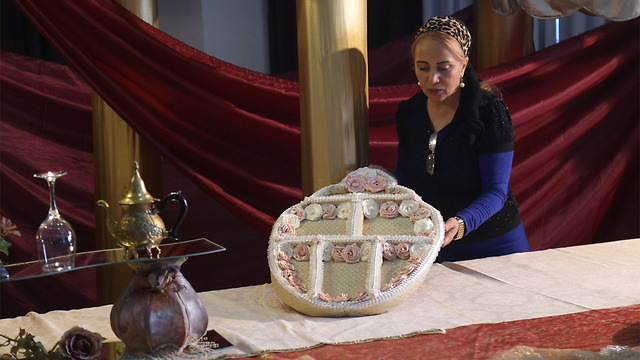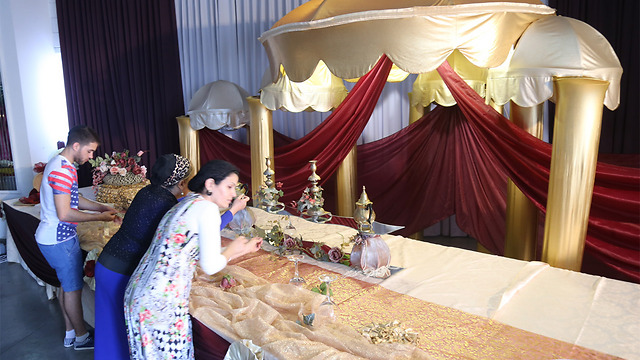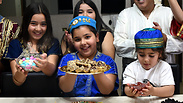
Children hold up classic Moroccan sweets during Mimouna celebration
צילום: חיים הורנשטיין, "ידיעות אחרונות"
Moroccan Passover tradition goes mainstream
Hundreds of families of Moroccan and Algerian descent prepare to celebrate end of Passover with a Mimouna, a celebration that includes lavish sweets and pastries that has become widely celebrated among all sectors in Israel.
Hundreds of families of Moroccan and Algerian descent prepared to celebrate the end of Passover Thursday night with a Mimouna – a celebration during which the families open their homes to share a lavish display of various sweets and pastries.
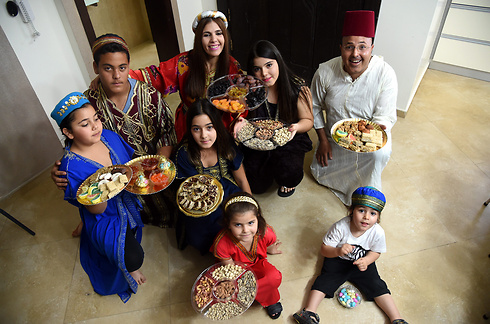
The Mimouna has become recognized as a national holiday in Israel, and according to Dr. Meir Buzaglo, the Director of the Philosophy department at the Hebrew University in Jerusalem, the holiday that has been celebrated for hundreds of years has become widely celebrated in Israel, even by those who are not of North African descent.

The Avitan family prepares for the Mimouna holiday that marks the end of Passover (Photo: Haim Hornstein) (צילום: חיים הורנשטיין, "ידיעות אחרונות")
"There has been a development in the meaning of the holiday," says Dr. Buzaglo. "The value of being a host has grown. It's a day of mutual reciprocity among all sectors of Israeli society," he says.
Historically, the holiday was primarily celebrated in Morocco, where the Arabs were accustomed to bringing the first bite of Hametz (leavened foods forbidden on the Jewish holiday) to the local Jews at the end of Passover.
"A day before Passover, the Arab family received a platter full of good things from the Moroccan Jewish family. They would not return it empty but rather with the first Hametz (they would fill it with) flour, honey, butter, mint leaves and milk," explains Dr. Buzaglo.
"It is also a holiday that announces the coming of spring, but became to be known for hosting. In Morocco, all the homes were open – my home, your home. People were accustomed to visiting one another. The doors were open," says Dr. Buzaglo.
The traditional holiday of Jews of Arab descent has also been utilized by politicians, who according to Dr. Buzaglo, use the holiday as a photo-op and to "please the Moroccan community," which has been sidelined in the past.
"It is a day to seemingly go down to the nation, but the more interesting thing is the process the holiday is going through in Israel. From a day of the Moroccan community to a national holiday. It is celebrated in public, after leaving the community, and the municipalities adopted the holiday," says Dr. Buzaglo.
According to the philosophy scholar, the holiday has the potential of being a day of outreach between the Jewish communities of Arab descent and other communities within Israel.
"Nobody ever thought that this holiday had the potential to be a day of national mutual reciprocity. This is the direction we want to nurture and build. The holiday has a very important role in Israel, a land of divisions," says Dr. Buzaglo.
This year, Dimona is celebrating the Mimouna for its 60th year. Hundreds of kilograms of mufleta, a Moroccan pastry, have already been ordered.
The city of Dimona, which was established by immigrants from North Africa and Romania, became the capital of the Mimouna in southern Israel and even immigrants from the former Soviet Union are known to join in on the celebrations.
The Mayor of Dimona, Beni Bitton, is expected to visit dozens of celebrations taking place in the city on the night of the holiday. Bitton believes that out of the 12,000 homes in Dimona, about 70 percent of them will be celebrating the traditional Moroccan tradition. "The secret of the magic is the familial aspect and the keeping of tradition," says Bitton.
"There are those who say that the meaning of the Mimouna is fath and others say that the literal translation is 'lucky.' The Mimouna, despite the many interpretations and beliefs, is for me a bridge. A bridge to bring together the Mizrahim and the Ashkenazim. The Mimouna has become a thing of the people of Israel," says Dr. Buzaglo.
Matan Tzuri and Gilad Morag contributed to this report.










